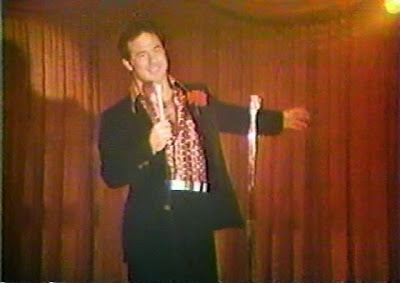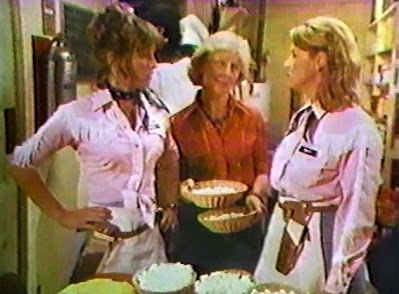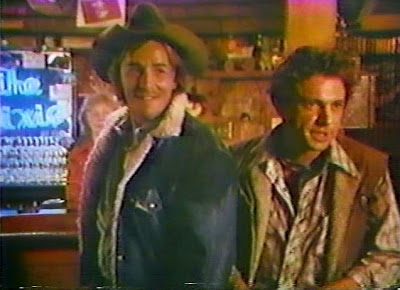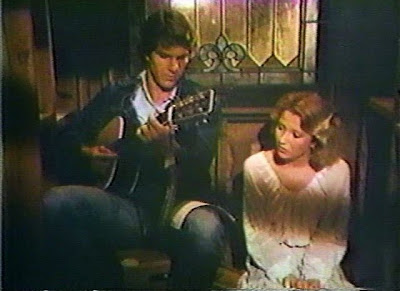Producer: Lauren Shuler
Music: Bradford Craig
Cinematographer: Ric Waite
Original Air Date: January 8, 1979 on NBC (Rob Cohen- Executive Producer); 100 min
Cast:
Victor French (Mac), Candy Clark (Sharee), Louise Latham (Fanny), Don Johnson (Cowboy), Jamie Farr (Snuffy McCann), Sheree North (Lettie Norman), Jeff Altman (Marvin Laurie), Pat Ast (Vera Elvira), Ed Begley Jr. (Moss Tillis), Gary Bisig (Roy), Joan Goodfellow (Marcy), Rick Hurst (Harry), Howard Itzkowitz (Duke), Roz Kelly (Doreen Reese), Mary McCusker (Anita Nutter), Melinda Naud (Joanne Nutter), Dennis Quaid (Roy), Kyle Richards (Laurie Nutter), Timothy Scott (Frank Smith), Allan Warnick (Reynald), Tanya Tucker (Sharon Singleton), Henry Gibson (Milt Cavanaugh), Dennis Burkley (Big Arnold), Bob Schott (Buddy), Corey Rand (Pepe Benasquez), Richard Collier (Bronco Andy), Brenda White, Michelle Michaels, Barbara Wiggins, Bernice Criswell (Highlighters)
For the big screen, Joel Schumacher had written and-or directed several ensemble films in the 1970s and 80s (Car Wash; D.C. Cab; St. Elmo's Fire). For the small screen, he also made this delightful rural-tinged fable about heartbreak, soul searching and dollar ninety-eight divas, all during one night at a roadside tavern's talent contest. Mac, the cynical bartender who owns and operates the Dixie Bar and Grill with his buoyant wife Fanny, is convinced that no one will show up to their first ever Monday night amateur talent contest, since it is pouring rain outside. But, as part of this film's big joke, where there's a fleeting chance at fame and fortune, there are droves of starstruck nobodies, talented or otherwise, who will clamour for the opportunity. And, as the other half of this film's quotient, despite the weather, the place will always be filled with their beer-swilling regulars who provide for the viewer just as much drama and entertainment as the people onstage.
Amateur Night at the Dixie Bar and Grill is a subtly satirical swipe at stardom (which has lost none of its relevance in this age of YouTube fame and American Idol), with its pretty comprehensive catalogue of traditional showbiz caricatures: hustlers, drama queens… and even one drag queen. While these caricatures are nothing new to anyone who has ever seen a movie or TV show with a similar plot, the enjoyment is had in poking fun at these very stereotypes. There are The Nutter sisters (one of whom is fiercely competitive with her sibling for the spotlight) whose song and dance act is sabotaged by an unfortunate attack of hiccups. There is a diva named Doreen Reese (Roz Kelly! aka- Pinky Tuscadero on TV's Happy Days) who surrounds herself with an entourage (including agent, makeup artist and bodyguard), superfluous for even a little roadside lark like this, yet the traditionally sycophant "yes people" cocoon her from the fact that she's as talented as a sheet of plywood. In between all of the standard amateur night staples of lame comedians, baton twirlers, ventriloquists and off-key warblers, the event is emceed by the typically cheesy radio announcer guy, who even uses his "local celeb status" to pull some favours, and remind us how much showbiz is based on mutual backscratching (or backstabbing). We are also instilled the sobering reality that stardom isn't so bloody marvellous via the washed-up doo-wop singer, his career derailed by alcoholism and meekness, who is hired as contest judge. The future of these fledgling entertainers (be it a lucrative recording contract, or dinner for two at the bar and grill) is dependant upon his verdict, so naturally he is hit up with threats and favours in equal measure.
Offstage, this film is also a gentle spoof of the rural film clichés so popular at the time. The stories of disappointment, loneliness, and loving the wrong person could liberally be swiped from the country records on the Dixie's jukebox. Beer salesman Harry is stuck on waitress Sharee, whose husband is in the slammer without any hope of parole. Her co-worker Marcy is stuck on drunken regular Cowboy (Don Johnson in a hilarious sendup of machismo, as this fun-loving hard-drinking good ole boy hobbles around on a crutch), who will never settle down. Mac is disappointed in his son Roy wasting his talent, emphasized again tonight when the cops escort him to the bar for rolling a joint. The element of past regrets and heartbreaks don't come any more vividly than in the characterization of the boozy floozy Lettie whose barstool dialogue is full of life's hard knocks (yet, another way in which this movie slyly subverts its cliches, her constant, colourful metaphors such as "Life is like the joke written on a cocktail napkin" would give her carte blanche at a beat poetry session). But like some of the best rural-set films of the age (like Handle With Care), these characters are never cast as buffoonish. Even the hick characterizations of Cowboy and Big Arnold are given hints of humanity beneath their flannel shirts.
The success of this impressionistic film relies much on the ingredients that set it apart from others of the "let's put on a show" routine. In a rare lead, Victor French (best remembered in supporting roles for TV's Little House on the Prairie and Highway To Heaven) is very good as the cynical father, well-contrasted with Louise Latham as the nurturing wife (truly the rock of the relationship), and surrogate mother even to her staff and their "boyfriend problems". Candy Clark and Sheree North (as the doomed Lettie, who lends some film noir ambiance to the hoedown) are always a joy to watch, and even the small roles have a chance to shine. The resident chef does everything but flip burgers, such as watching cooking shows and police dramas on his little TV set, and doubling as lighting technician for the show. The gifted Pat Ast does a great show tune medley; a man dressed in a bear costume rocks out to the country chestnut "I Wish I Was A Teddy Bear"; and otherwise, where necessary, the cast portrays the remaining hopefuls with just the right balance to show untalented their characters really are. There is also some novelty in casting country star Tanya Tucker as a hopelessly stage fright singer- when she gets enough confidence to return to the stage, it's Tucker's own medley "I'm The Singer, You're The Song" that she croons. Interesting too is the way music is often used to convey people's feelings, especially Marcy, whose onstage rendition of "Why Don't You Let Somebody Love You" (a very touching scene) is a serenade to the ne'er do well Cowboy.
And if things weren't already busy enough, existing on the margins of this mosaic is someone named The Disco Killer, who has been traumatizing local roadside gin joints like the Dixie. Just what is the deal with that? Well, you'll have to see. Like most things in this movie, nothing is as obvious as it appears.
Because of the ensemble cast and character-driven narrative one is compelled to call this film "Altmanesque" (in fact, the casting of Altman regular Henry Gibson as the talent judge may be a nod and wink in that direction). Yet, it is also a piece of Schumacher's work at the time. The film recalls the same sad poetry of his screenplay for Car Wash. Both of these works are mosaics featuring many characters within a compressed period of time, and refreshingly, neither makes the mistake that so many "day in the life of", "night in the life of" scenarios commit. Not everything gets properly resolved, and not everyone gets their act together when the final credits roll. Realistically, few of these people experience great revelations. Giving a bluesy texture to the comedic scenario is Ric Waite's luminous cinematography, accentuating the Dixie's fluorescents and smeary neon. Although characters big and small are given quirks in Schumacher's script, his meticulous direction (with lots of coverage and reaction shots) gives them added dimensions. Like the best of Robert Altman's ensembles, this snapshot truly feels alive! I can give it no higher compliment than that: one has the visceral feeling of having spent a woozy night in their company. All said, it may be just another night at the Dixie Bar and Grill. At the end, many of these people have little victories, some have little disappointments, but they are all worth spending some time with.



















